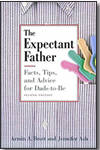How Fatherhood Changes Men:
Q: People always say that life will never be the same
after having a child. How, exactly does becoming a father change a man?
A: There's an old saying in the Talmud that a man
has three names: the one his parents gave him at birth, the one that
others call him, and the one he calls himself. A person's identity,
according to the rabbis, is a rather amorphous thing. What the rabbis
don't talk about is that all three of those names are subject to change
over time—especially the one you give yourself. So who are you
these days? The same person you were a few years ago? Probably not.
And one of the biggest reasons you're not is that being a father has
changed you.
Over a period of nearly two years, University of CaliforniañBerkeley
researchers Phil and Carolyn Cowan asked a large number of men to draw
a circle and divide it up into sections that reflected how important
each aspect of their life felt—not the amount of time in the role.
Over the study period, childless men showed a significant increase in
the "partner/lover" aspect. But young fathers were squeezing
"partner/lover" into a smaller space to accommodate the significant
increase in the "parent" piece of the pie.
As the parenting pie grows, other things happen too. Here are a number
of ways that the men in my survey (and several other studies as well)
said fatherhood changed them:
- Confidence and pride. Having a close relationship with your child
helps build his confidence and self-esteem. It also helps build yours.
Being able to stop your child's tears, making him laugh, or knowing
how much he idolizes you can make you feel incredibly competent, and
the pride you feel when you see all the great things he can do becomes
confirmation that you're doing pretty well at this whole fathering
thing. For a while, at least, your child is going to share all your
tastes—in music, literature, movies, art, career, politics,
and food (as long is it's not too spicy). A lot of these things will
change as your child grows up. But I can hardly describe the feeling
of pride I get when my kids start discussing Hitchcock movies with
my adult friends, belt out a few Janis Joplin lyrics, or pop in a
CD of Elgar's cello concerto while they're doing their homework. But
beware. Confidence and pride are often made of pretty thin veneer:
any misbehavior—especially public—can suddenly make you
feel you feel as though you've failed as a father.
- Patience—and a better sense of humor. Things are going to
go wrong, whether you like it or not, and you have two choices: take
everything seriously and try to change the world, or roll with it
and laugh. Learning to laugh at yourself can rub off in other areas
and might make you more understanding of the mistakes other people
make.
- Flexible thinking. At this point it's almost impossible to tell
the difference between your child's needs, your needs, and your partner's
needs. In a perfect world they'd mutually reinforce one another. But
on this planet, these needs "are to varying degrees in opposition,
imposing frustrations and sorrows and forcing mutual adaptation,"
says the Group for the Advancement of Psychiatry (GAP). As you get
more experienced as a parent, your ability to prepare for the future
and come up with contingency plans will grow. You'll also learn the
incredibly valuable skill of being able to see a variety of different
points of view at the same time. For example, most new couples say
that having children brought them closer together. At the same time,
though, they say that labor around the house has been divided along
traditional lines.
- Return to childhood. Having kids gives you a great opportunity to
reread all those great books from when you were a kid and disappear
back into the world of King Arthur and the Hobbit. It also gives you
a rare chance to say words like "poop" and "pee"
in public again.
- Creativity. A lot of parents suddenly get inspired to create. A.
A. Milne (who wrote the Winnie the Pooh books) and J. K. Rowling (of
Harry Potter fame) are just two who wrote for their kids. If you're
giving your kids music or art lessons, you might develop a talent
you never thought you had or rediscover the urge to perform at school
talent shows.
- Reordering priorities. Having kids contributes to a heightened awareness
of other's perspectives, says researcher Rob Palkovitz. A lot of guys
admit that they were somewhat selfish and self-centered before having
kids. This isn't necessarily a negative thing; it's simply an acknowledgment
that having people depend on you and putting their needs before your
own isn't something that comes naturally to most people before they
become parents. What's especially interesting is that, according to
Palkovitz, getting married didn't trigger this same realization.
- Changing values. Becoming a father will make you take a long, hard
look at your fundamental beliefs and values. Things you may have thought
were harmless when you were younger, such as not caring about money
or material possessions, promiscuous sex, and even smoking a little
dope, look completely different now that you've got a family to support.
You'll start seeing the world in different terms. You may have thought
about issues like pollution, terrorism, energy policy, Latin American
debt, homelessness, AIDS, poverty, and even cloth vs. disposable diapers
before, but now, instead of being abstract things that happen to other
people, they're possible threats to your child and your family.
Having children will also help you clarify a lot of your beliefs. Teaching
your child to say that the guy you didn't vote for in the last election
is a jerk is one thing. But try explaining to your child—in terms
he can understand—what war is, what the death penalty is, why
some people are rich while others live on the street. You might find
yourself changing your mind about a few things now that they might affect
your family.
Interestingly, older fathers report doing less soul-searching than
younger fathers. The older guys come into fatherhood feeling more mature
and having had more of a chance to hone their philosophy of life. |


